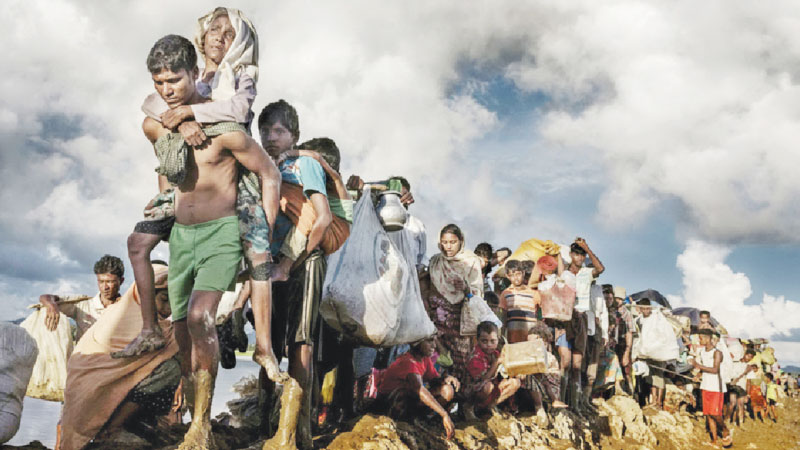
Rohingya influx: A serious burden on Bangladesh

fleeing ‘ethnic cleansing’ from the neighbouring Rakhine State on August 25, 2017.
Prime Minister Sheikh Hasina, based on the country’s own experience in the 1971 war of independence when millions of Bangladeshis had to take shelter to India, announced to stand by the persecuted Rohingyas until things became normal for their return.
The government launched its diplomatic efforts to send them back and signed deals with Myanmar. But three years on, nothing has changed in Myanmar. Even a single Rohingya could return to their motherland.
Over 1 million Rohingya refugees, who were driven away by the Myanmar military-backed government three years ago, have appeared as a serious burden on the society and economy of Bangladesh.
Prime Minister Sheikh Hasina earned the Mother of Humanity title by giving the helpless Rohingya refugees shelter and other humanitarian assistances. Rohingyas in thousands started fleeing to Bangladesh on August 25 in 2017 to escape Myanmar’s state-sponsored persecution in the Rakhine state.
Prime Minister Sheikh Hasina announced giving them shelter by saying “If my government can feed over 160 million people of Bangladesh, we would also be able to arrange food for 1 million people more.” Her announcement came at a time when most of the global leaders were mum over the persecution of the religions minority.
The big powers and the international community have limited their activities within the humanitarian relief, though experts say the crisis is more than just humanitarian assistance.
With the recent clearance operations by Tatmadaw against the Arakan Army in Rakhine and the election in November in Myanmar, Bangladesh has actually hit an impasse in terms of the repatriation process.
“We are now faced with a strategy on part of Myanmar authorities to do nothing to restore normalcy in Rakhine, but to create difficulty for prospective returnees, and finally to do whatever needed to frustrate efforts to repatriation,” foreign secretary Masud Bin Momen said on Monday at an event.
Professor of international relations Delwar Hossain considers this as a “big failure” of the international community to deal with the worst-ever humanitarian crisis after World War 2.
“Bangladesh did its best. But it’s not a bilateral issue. It’s a regional and international issue. But all big powers failed to do the needful in this regard,” he told Bangladesh Post.
“It’s natural that Myanmar would not cooperate with Bangladesh as they don’t want to take them back. We need to highlight the failure of the international community and the regional groupings such as ASEAN and the neighbours India, China to resolve the crisis,” he said.
US Ambassador Earl Miller at the discussion organised by the North South University said the United States will continue “to be a leader in providing humanitarian assistance, applying diplomatic pressure, and serving as a catalyst in the regional and global response to the Rohingya crisis.”
“But, as we all know, this has to be an effort by the global community,” he said, appealing for “every responsible and right-minded nation to join us in finding a solution to the Rohingya crisis”.
“Every right-minded action counts. Every right-minded action saves lives. We have seen it the past three years. We know it to be true.”
The Rohingya crisis is a complete tale of marginalisation of a community from all aspects- economic, cultural, social and finally political.
They are the victim of a culture of persecution from Myanmar, the country that maintained a culture of atrocities against them, to destroy them as a community.
As such, solutions to the crisis must be found in Rakhine and in Myanmar.
“In that sense, this is Myanmar’s internal problem. The solution must therefore be sought inside Myanmar,” the foreign secretary, Momen, said while speaking at a webinar on the crisis.
“They have taken refuge in Bangladesh to flee atrocities and Bangladesh has opened her door so that their lives are safe temporarily. But, they must go back to their country of origin.”
“Given the enormity of challenges associated with longer-term stay on foreign soils, I would rather demand the international community to refocus on the creation of basic services, safety and security and options for livelihood for returnees,” he said.
“They should make sincere and greater efforts to secure conditions for Rohingyas to return to Myanmar and reintegrate into Myanmar society, with a clear pathway to citizenship.
Editor & Publisher: S. M. Mesbah Uddin
Published by the Editor from House-45,
Road-3, Section-12, Pallabi, Mirpur
Dhaka-1216, Bangladesh
Call: +01713180024 & 0167 538 3357
News & Commercial Office :
Phone: 096 9612 7234 & 096 1175 5298
e-mail: financialpostbd@gmail.com
HAC & Marketing (Advertisement)
Call: 01616 521 297
e-mail: tdfpad@gmail.com